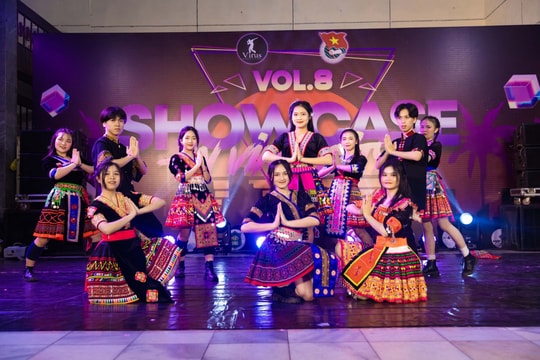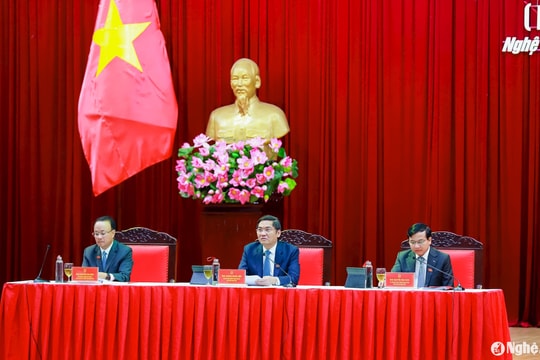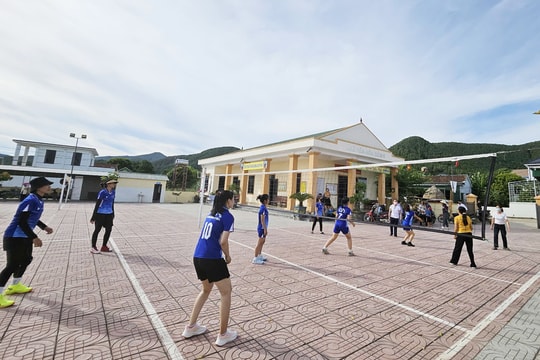Difficulties in building cultural villages, hamlets and blocks in Nghe An
In recent years, the movement to build cultural villages and cultural neighborhoods in Nghe An has become an important factor to preserve and promote traditional cultural values, improve the spiritual and cultural life of the people, and promote the development of the grassroots cultural movement. However, there are still many difficulties and challenges, requiring more active participation of sectors and localities.
The results
Recognized as a cultural village since the early 2000s, over the years, the cadres and people of Hamlet 8, Nghi Lam Commune, Nghi Loc District have always strived to promote the good cultural values of the residential area and become one of the bright spots in the movement to build a cultural village in Nghi Loc District. Currently, the hamlet has 267 households with 886 people, of which Catholics have 57 households with 216 people.
Mr. Nguyen Van Hoa - Secretary of the Party Cell of Hamlet 8, Nghi Lam Commune said: "In recent years, the hamlet has built and supplemented conventions and village regulations in accordance with the actual situation; renovated the campus, supplemented and redecorated the Cultural House - the hamlet's sports area to be spacious, green, clean and beautiful, creating conditions for the activities of the movement "All people unite to build a cultural life" to develop. In 2023, the hamlet had 253/266 (95.11%) households achieving "Cultural Family"; 248/266 cultural households for 3 consecutive years, including 7 typical cultural households in the period 2021-2023. The rate of people participating in sports training in the hamlet reached 45%, 50% of families met the standards of sports families. People's lives are increasingly improved, the average income per capita reached 63 million VND/year.
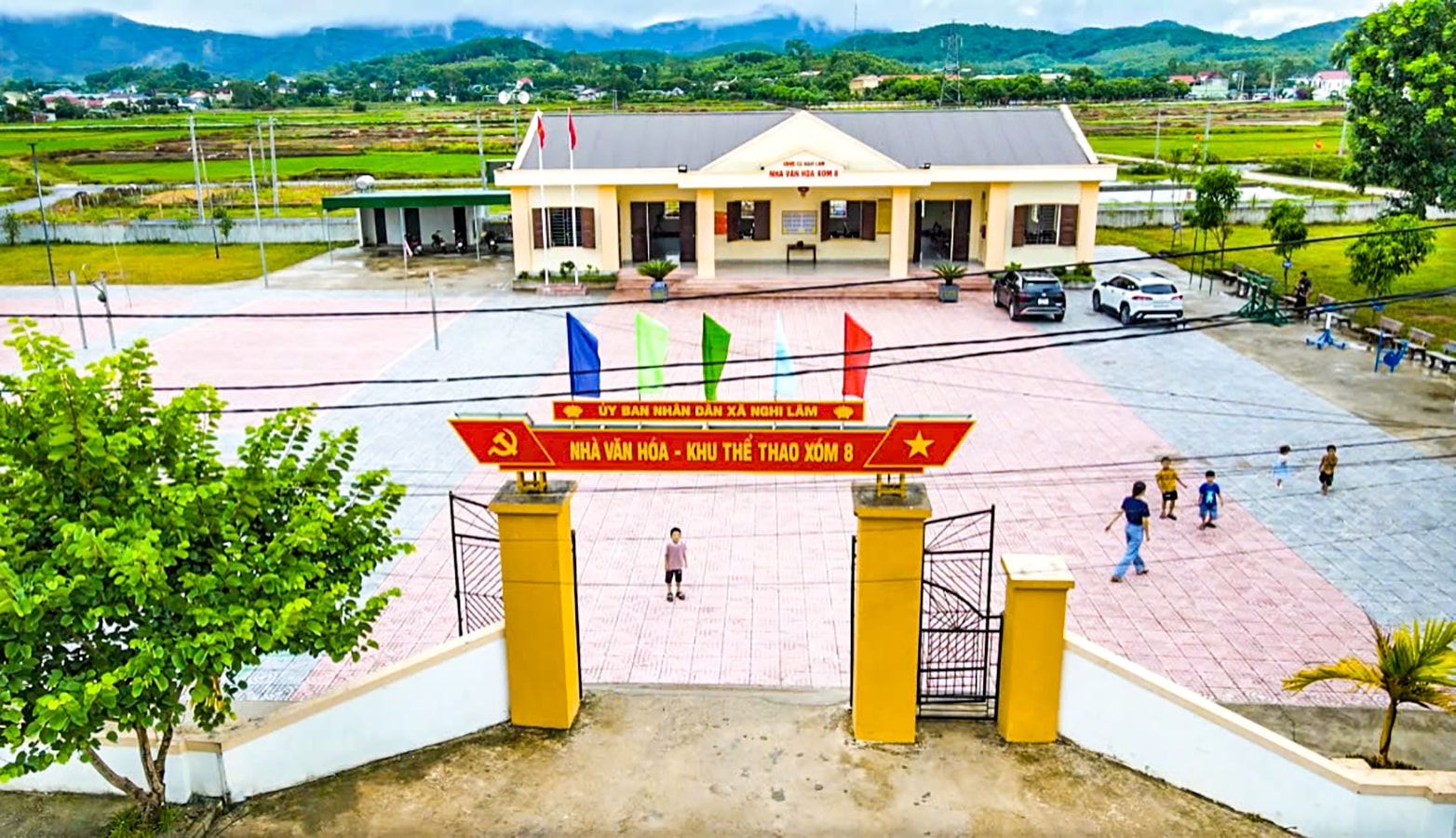
In recent times, the movement to build cultural villages has spread strongly in Nghi Loc district with the proactive and active participation of the people. In particular, through the movement, many cultural and sports items and institutions of villages and residential groups have been supported by the local authorities and people to build such as: village gates, cultural houses, sports grounds, communal houses - village temples, inter-village roads, etc. The system of cultural and sports institutions has been completed, creating conditions for cultural, sports and community activities to develop. Since then, the cultural and spiritual life of the people has been gradually improved and enhanced, traditional cultural values have been preserved and promoted. In 2024, the whole district is expected to have more than 242/250 hamlets and blocks (nearly 96.8%) recognized as cultural villages and cultural blocks.
Promoting the movement "All people unite to build a cultural life", Do Luong district strengthens propaganda work to make people aware of building cultural families, cultural villages and neighborhoods and mobilizes people to well implement the conventions and village and residential group conventions; well organize healthy and diverse cultural, artistic, physical education and sports activities, suitable to the characteristics and traditions of each locality...
Block 3 is a typical block in building a cultural block of Do Luong town. Cultural, artistic and sports movements in the block are organized regularly, at the same time selecting and establishing teams to participate in tournaments organized by the town and winning many high prizes. The clans have focused on educating their children to stay away from social evils and not violate security and order. Taking care of the work of promoting learning and talent in families and clans is also focused; each year, people in the block contribute from 10 to 18 million VND to the scholarship fund. Every year, the block has children who are excellent students from the district level and above; it is an excellent unit in the study promotion work of Do Luong town. In 2023, the block had 407/437 households recognized as cultural families, reaching a rate of 93.13%; recognized by the People's Committee of Do Luong district as a typical cultural unit at the district level.
.jpg)
According to the report of the Department of Culture and Sports of Nghe An, in recent years, the movement "All people unite to build a cultural life", building cultural villages and blocks associated withnew rural construction movementThe movement to build civilized urban areas has fundamentally changed the appearance of villages, hamlets, and city blocks, contributing to improving the material and spiritual life of the people, promoting the great national unity bloc, preserving and promoting traditional cultural values, and promoting comprehensive socio-economic development.
Through the implementation of criteria and standards according to Decree No. 122/2018/ND-CP of the Government (now replaced by Decree No. 86/2023/ND-CP) stipulating the framework of standards and procedures, procedures, and dossiers for awarding the titles of "Cultural Family", "Cultural Village, Residential Group", "Typical Commune, Ward, and Town", it has contributed to raising awareness and responsibility of people in the community. By the end of 2023, the whole province had 2,604/3,797 villages, residential groups, and residential areas recognized as cultural titles, reaching a rate of 68.6%.
Responding to the movement to build cultural villages, many villages have added regulations on cultural lifestyle based on the positive points of the village covenants and traditional conventions. Many regulations on weddings, longevity celebrations, funerals, death anniversaries, festivals... according to cultural lifestyle have been actively implemented by the people.
Throughout the journey of building cultural villages, in many localities, there are many new constructions, many roads are widened and opened; the lighting system on both sides of the roads seems to add to the increasingly prosperous rural picture. Along with that, the cultural institution system has been invested in and built to be spacious and synchronous.
By the end of 2023, the whole province had 3,442/3,797 hamlets with cultural and sports facilities, of which the number of hamlets with standard cultural houses was 82.2%; the number of hamlets with standard sports areas was 85.5%.
There are still many difficulties.
According to Resolution No. 18/2020/NQ-HDND dated December 13, 2020 of the Provincial People's Council on the 5-year socio-economic development plan (2021 - 2025), the target for the rate of cultural villages, hamlets, and urban blocks by 2025 is 71 - 73%. However, from 2021 to now, the rate of cultural villages, hamlets, and urban blocks in the province has only increased by 1.2% each year (in 2021 it is 66.2%, in 2022 it is 67.4%, in 2023 it is 68.6% and in 2024 it is expected to reach the annual plan of 69.8%). Thus, with the development speed of the movement as in recent years, stronger efforts are needed to reach over 71% of cultural villages, hamlets, and urban blocks.
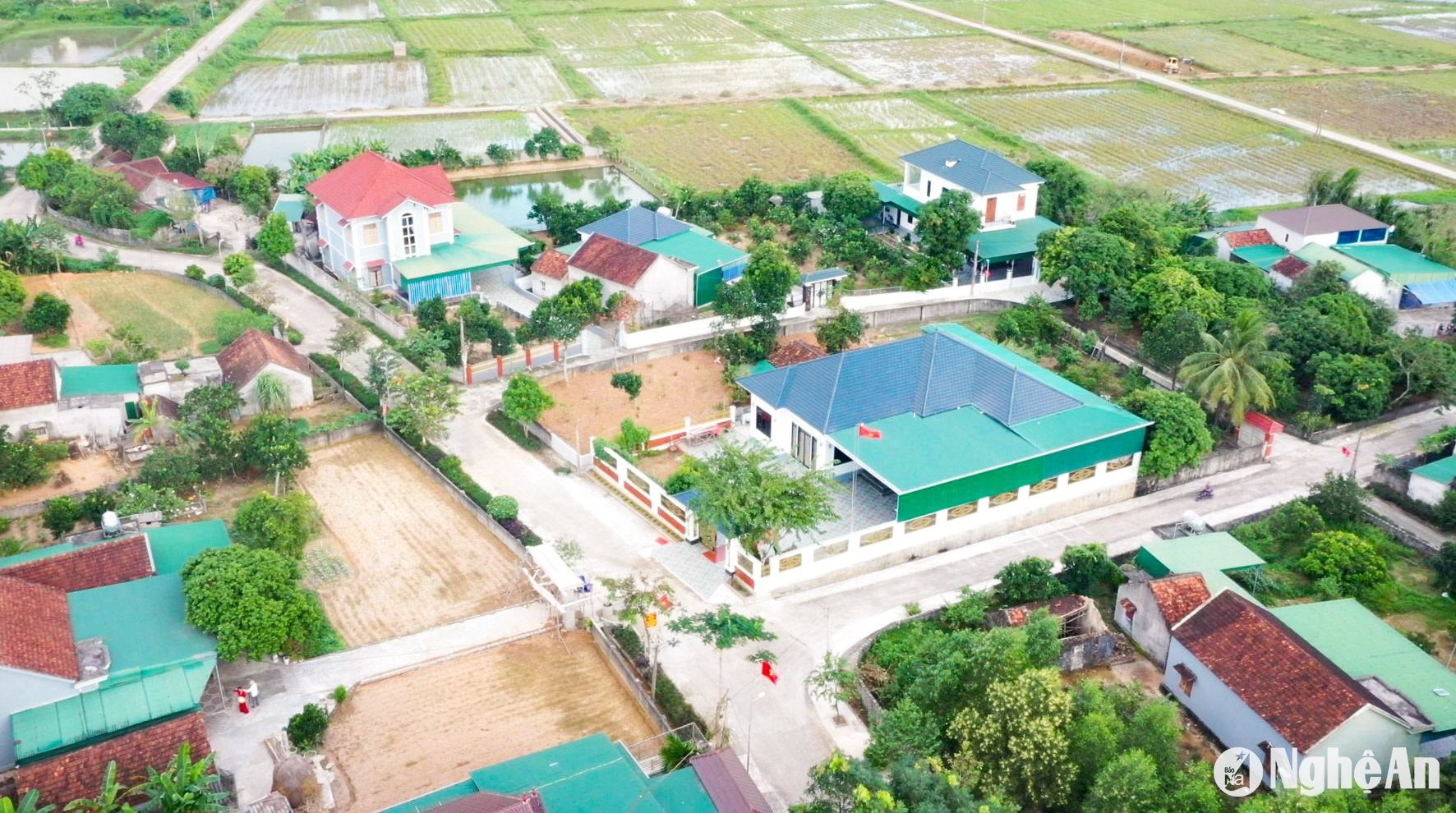
According to the leaders of the Department of Culture and Sports, currently, the quality of the movement to build cultural villages and urban blocks is not uniform among regions. If in the plain districts such as Hung Nguyen, Nghi Loc, Do Luong, Dien Chau, Quynh Luu, Yen Thanh..., the rate of cultural villages and urban blocks reaches 77 - 90%, then in the mountainous districts, the rate of cultural villages and urban blocks is still quite low such as Que Phong, Con Cuong, Tuong Duong, Ky Son...
Even in localities with a high rate of cultural villages, hamlets and residential blocks, there are still difficulties and problems; for example, in Quynh Luu district, where 77.5% of hamlets and residential blocks have achieved the cultural title, Mr. Pham Van Giang - Head of the Department of Culture and Information of Quynh Luu district admitted that currently the quality of cultural residential areas in some localities of the district is not high and unsustainable, especially in coastal and mountainous communes.
“The reason is that some Party committees and local authorities in Quynh Luu district have not paid due attention to building and improving cultural life; the positivity, initiative and volunteerism of a part of the people in participating in the movement in some places are still low. In some localities, the situation of crime, social evils, domestic violence, school violence, child abuse, environmental pollution... has not been overcome; the problem of ethics, lifestyle and living habits has shown unhealthy manifestations. In addition, cultural officials at the commune level have to work in many fields (culture, health, education, propaganda, policy...), so the work of advising, managing and organizing activities at the grassroots level is still limited, the quality and efficiency are not high, which also greatly affects the development of the movement "All people unite to build a cultural life" as well as the movement to build cultural villages, hamlets and blocks today", said Mr. Pham Van Giang.
According to Ms. Tran Thi My Hanh - Director of the Department of Culture and Sports, to overcome difficulties, shortcomings and time, the sector will promote propaganda work, raise awareness of Party committees, authorities and people in the whole province to participate in building cultural and sports institutions and carry out the emulation movement to build cultural families, cultural villages and residential groups, linking the movement to build new rural areas and the movement "All people unite to build a cultural life" with the campaign "All people unite to build new rural areas and civilized urban areas" in an effective and practical manner.
It is necessary to do a good job of training and fostering the team of cadres doing grassroots cultural work in order to gradually improve the quality, efficiency and diversify cultural, artistic, physical training and sports activities; organize professional training, improve management skills and organize activities to build cultural life, build new rural areas, civilized urban areas in residential areas for village heads, heads of residential groups, heads of residential front work committees, especially in residential areas. In addition, localities need to promote the development of advanced models and typical examples, thereby replicating them in the province, contributing to the movement's development in depth and quality.
Ms. Tran Thi My Hanh - Director of Nghe An Department of Culture and Sports

